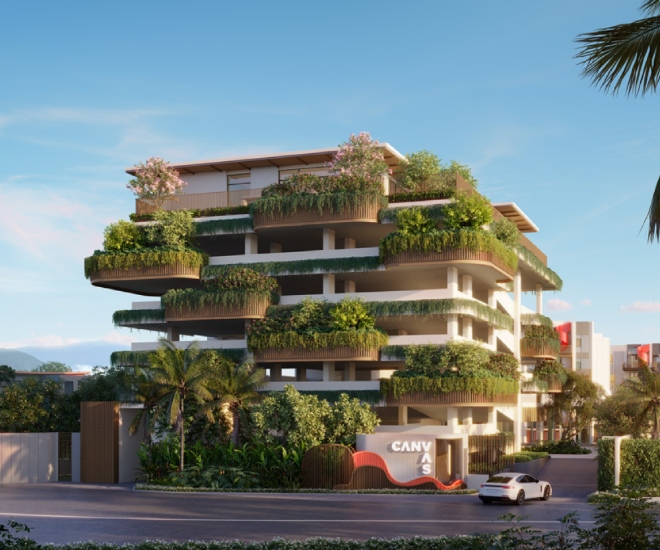The Canvas (A Sansiri Property)
Phuket has developed a strong reputation as a resilient investment hub. Over the last two decades, Phuket has significantly established itself, consistently providing favorable or outstanding returns in real estate investments. While there were some setbacks, such as the COVID pandemic, any organization globally would envy the type of consistent growth in value and sales volume that Phuket has demonstrated year after year since 2005.
The Emerald Central Condominium in Southern Phuket
However, it’s important to note that it’s not all rosy; the 2004 tsunami, the 2020 COVID crisis, and an ongoing worldwide financial downturn have all impacted Phuket. But as soon as each crisis passed, Phuket quickly resumed its activities, with the classic interplay of supply and demand returning. Currently, we are witnessing a convergence of factors that give the impression that Phuket may be in a bubble poised to burst.
Looking North-East along the Phang Nga Bay Coast
What are these factors? Increased traffic, “over-tourism,” an excess of available properties (oversupply), fluctuating Russian tourism patterns, and the unpredictable Chinese market. While there are indeed points deserving of scrutiny and potential action, I assert that regardless of the circumstances, any downturn will be temporary, and Phuket will rebound, continuing the trajectory it has maintained for two decades.
Andara Resort & Villas
“Phuket is significantly more crowded than it used to be.”
True.
For me and several thousand fellow expatriates who can recall how it was more than a decade ago when one could traverse the island in roughly 45 minutes. Prior to the 2014 coup, life in Phuket was quite idyllic.
False.
For the more than 10 million visitors annually who have no prior experience of the island’s past. They assess it as it is now, comparing it to their hometown experiences. The enchanting contrast between Phuket and the places they come from has only slightly diminished over the last two decades due to worsening conditions elsewhere at a rate that may match any decline in Phuket’s daily life.
Read More: Botanica Luxury Estate in Phuket
Poolside respite for residents to enjoy at Nai Harn Baan Bua Tree Villa
"Phuket is Overdeveloped."
True again.
This holds true for me and a few hundred thousand visitors who seek a peaceful beach holiday filled with coconut drinks, fire shows, and sunset snapshots. The extensive construction is frustrating. The evolving population is bothersome, as adapting to "newcomers" is perpetually challenging.
False.
This is the perspective of the 14 million yearly tourists who are indifferent to nature or yoga until it’s time for a "selfie." As long as they can find a secluded spot with a palm tree and a yoga mat for their influencers, they’re satisfied. Yet, amidst their virtue signaling, they crave food, drink, and entertainment, much like what they enjoy back home. Most don’t care about local art, architecture, or customs; they primarily focus on photographing their meals and flaunting their fitness after attending Muay Thai classes or "Hot Pilates," seeking their daily dose of social media validation.
Read More: Thailand’s Property Outlook – Windows of Opportunity in Phuket
Stylish Sino Pool Villa in Cherng Talay, Phuket, Thailand.
“It’s too expensive now.”
True.
For me, and anyone who visits Phuket expecting an affordable, laid-back beach experience reminiscent of "Eat, Pray, Love." Prices are rising; real estate costs are approaching (temporary) madness. Taxi fares still seem outrageous, and even with rideshare apps, a decent meal that once cost $3 now averages about $8.50.
False.
For every tech entrepreneur, influencer, crypto mogul, local property owner who leases out properties, real estate agent, developer, architect, property manager, hotel, or rental agency that is thriving, each extracting their fair share of profits, often feeling justified in their post-COVID recovery. These individuals have amassed significant fortunes, while the tourists, who aren’t the loudest critics, are overshadowed by a growing faction of expatriates lamenting the "good old days."
The Emerald Central Condominium in Southern Phuket
So, what’s the end game?
There will be a carefully selected term here adjustment. This will manifest unevenly across Phuket, already seen in Bangkok. “What’s an adjustment?” you may wonder.
An adjustment occurs when market dynamics fall out of sync. This phenomenon is prevalent and can be applied in various contexts. Grocery stores offer discounts, department stores have clearance sales, and local neighborhoods undergo adjustments.
It involves a balance of supply and demand influenced by market sentiment, which may or may not align with reality. A surplus of homes may arise, exceeding market absorption rates from previous years, causing some properties to linger on the market longer. Developers facing cash flow issues and large bank loans may lower prices or introduce incentives.
This slowdown will impact new developments, particularly affecting smaller, undercapitalized builders, while savvy firms might continue smoothly for now. Some prices will slightly decrease in certain markets, maintaining relative stability in others. However, the sales duration for new properties (especially those under development) is likely to increase.
Read More: Phuket Mega Villas Enjoying Brisk Sales
As smaller, financially-strapped developers go bankrupt, leaving unfinished developments scattered across the island, larger investors like Black Rock will see the potential and begin acquiring numerous properties. This will unfold much quicker than past slowdowns due to the desire to deploy capital and influence the market rather than focusing solely on immediate profits.
Such activity is expected to mitigate overall market declines, typically capping losses at around 10% in most regions (with some exceptions). Despite the outcries from less experienced developers and real estate agents, the market’s fundamental stability remains intact.
Within the next 25 months, as November 2026 approaches, hotels will proclaim bustling business during peak season, revealing that the “bubble” debate will lose traction.
But there’s more!
During these critical months, something extraordinary will occur, which I label “Escape from The Pearl of the Andaman.” (I’ve never termed it that before and it sounds odd, but here we are…)
Affluent expatriates, frustrated by increasing challenges, will discover alternative idyllic locations in Thailand resembling the lifestyle they appreciated two decades ago in Phuket. Thailand possesses vast beachfront areas, and once family ties to international schools drift away, a look towards the northern regions becomes viable. This shift is anticipated.
A distrust of “off-plan” developments, paired with a nostalgic return to a reminiscent lifestyle available in numerous seaside towns across Phang Nga province, will draw unprecedented attention. Foremost among these regions? The 50km coastal stretch along the Andaman, along with the 20km stretch of waterfront on Phang Nga Bay.
Coupled with the potential for a new airport, property prices that remain under 50% of Phuket’s, developed infrastructure geared for growth, and a rising demographic, the area across the bridge will effortlessly accommodate a significant share of the dissatisfied expatriate population. They will see that they can still frequent their favorite restaurants weekly while enjoying a simpler, quieter lifestyle with fewer traffic complications approximately 60km north.
And that, dear readers, is the expected trajectory.
Catch you in the Great White (sand) North!
Read More: The Top Luxury Hotel in Phuket, Thailand: Andara Resort & Villas
This article originally appeared on Michael Aumock’s LinkedIn page.
For more updates on luxury properties and real estate topics, click here.

